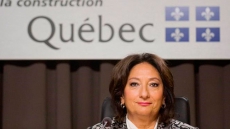OTTAWA — Tom Mulcair is drawing on his past experience exposing sexual misconduct among Quebec's doctors to propose a process for handling harassment complaints against members of Parliament.
The NDP leader is proposing that all parties work together to clearly define harassment, draft a new formal code of conduct that the Speaker of the House of Commons could enforce and appoint an independent, non-partisan officer of Parliament to investigate complaints.
Above all, Mulcair says the complaint process must be confidential and fair and give victims the unencumbered right to control their complaint, particularly their right to privacy.
He made the proposal Thursday in a letter to Prime Minister Stephen Harper and Liberal Leader Justin Trudeau, in response to Trudeau's decision earlier this month to suspend two Liberal MPs over complaints of "serious personal misconduct" from two female New Democrat MPs.
In an interview, Mulcair said the proposal is based on his own experience in the field, as well as the advice of experts he's consulted over the past week.
It bears striking resemblance to the process he adopted as president of Quebec's Office des Professions, which oversees professional regulatory bodies in the province, including their disciplinary procedures.
Mulcair's tenure at the professions board in the late 1980s and early 1990s was punctuated by a very public confrontation with the province's college of physicians and surgeons over its decision to allow an Ottawa psychiatrist to practice at a Montreal hospital, even though he'd lost his licence to practice in Ontario for having sex with a patient.
Michel Sparer, who was secretary general of the board at the time, says Mulcair never had any tolerance for sexual abuse but, until 1992, had been stymied by victims' refusal to come forward with details. The case of the Ottawa psychiatrist gave him the ammunition he needed to crack down.
It showed "insufficient attention" paid to the woman's complaint by the college, which displayed "almost humiliating prejudices about women alleging abuse," Sparer recalled in an interview.
"I remember Tom listened carefully and said ... 'Michel, we won't let that person or anybody else face such an attitude and denial of duty by the board,'" Sparer said.
"What Tom did 20 years ago, he said, 'We are going to change the culture and, if needed, we're going to change the law itself' and he did."
The result was that Quebec's professional code of conduct was amended to explicitly state that a professional who has sexual contact with a person to whom he or she is providing services constitutes an act derogatory to the dignity of the profession.
Mulcair also insisted on lifting the veil of secrecy that shrouded disciplinary hearings, while being careful to allow confidential proceedings when necessary to protect a complainant's privacy or reputation, Sparer recalls.
"We were not to force a woman who was completely traumatized by her situation to get involved in another trauma," he said. "The only compromise was on the basis of the respect and compassion for the human (being)."
That's consistent with the way in which Mulcair responded to complaints by two female members of the NDP caucus about the conduct of Liberal MPs Scott Andrews and Massimo Pacetti. He has said he knew about their allegations but did not pursue them because the women did not want the matter to become public.
He's also accused Trudeau of "revictimizing" the women by publicly announcing the two Liberals' suspensions were due to misconduct complaints from MPs of another party, though he was careful not to identify the MPs, their gender or party affiliation.
In an interview, Mulcair said 20 years ago Quebec's college of physicians and surgeons and other professional regulatory bodies refused to take allegations of sexual misconduct seriously and conducted "closed shop" disciplinary proceedings.
"We changed everyone's approach because we said, look, these cases have to be taken seriously, it is a serious matter and you have to put in place a structure that allows you to deal with it."
He said he's attempting to do "something similar" now in Parliament, which has no process for dealing with misconduct complaints by one MP against another.
"What we're proposing to do is to provide a structured approach where we can sit down, define things, come up with rules."
It remains to be seen whether a non-partisan process, with a guarantee of confidentiality for complainants, would be enough to persuade the two New Democrat MPs to lodge formal complaints against Andrews and Pacetti, both of whom deny the allegations. Mulcair wouldn't speculate.
"I'm just hoping that we can get this in place as soon as possible and continue to show compassion and take care of the people in question and try to move it forward as respectfully as possible," he said.






